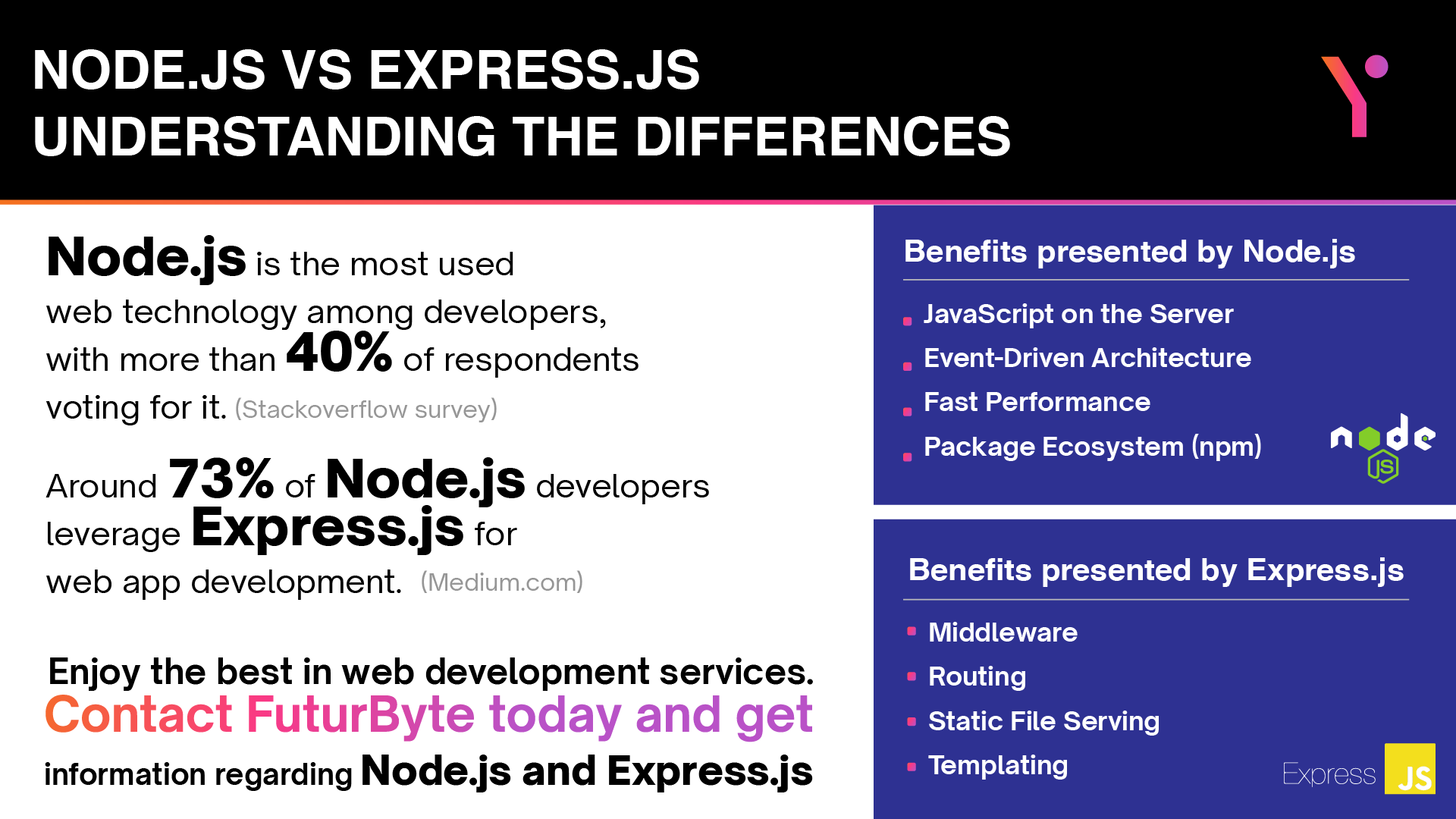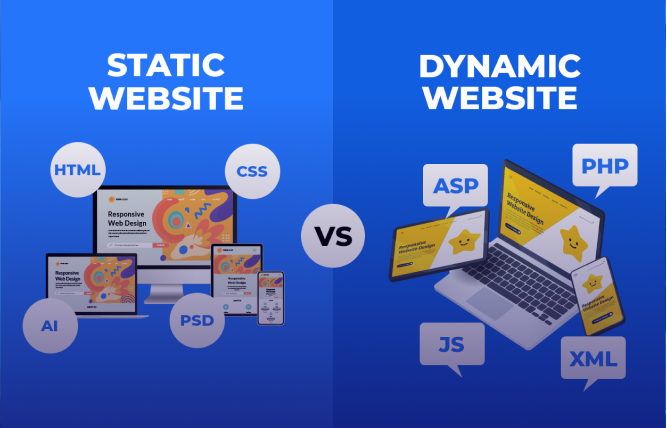Introduction
Feeling confused regarding the whole node js vs express js issue? Well, Node.js is the engine that allows JavaScript to run on servers. Express.js builds on that by providing helpful tools for the effective creation of web applications. Take note – Node.js is a vehicle’s engine, and Express.js is its steering wheel. Both play their part in the driving activity.
Node js vs Express js: The Powerhouse Couple
Try going through the landscape of web development. You will see a host of very impressive technologies. Among the giants there, two names that often stand out are Node.js and Epxress.js. These are often seen as a “power couple” that are utilised to create modern web applications.
Their names are quite often used interchangeably. This is why it is important to understand their unique roles. This is where this blog comes to assist you as it takes account of the functionalities of Express.js and Node.js. Of course, it is a wonderful read, even for those who are often into the node js vs express js debate and think that one can be used in place of the other.

Let’s look at Node.js first:
Node.js: Fuelling Server-Side JavaScript
Many proponents of Node.js in a node js vs express js debate agree that it takes centre stage as a cross-platform, open-source JavaScript runtime environment.
Generally, it was seen that JavaScript’s domain was present in web browsers, taking care of user interactions and altering the web page. Node.js destroys this point by allowing developers to execute JavaScript code on the server side.
This allows the building of interactive and dynamic web applications. Here are the strengths of Node.js:
Package Ecosystem
Node.js has a massive and growing package ecosystem – the Node Package Manager (npm). Commonly, it presents a great number of libraries and pre-built modules that serve a host of functionalities.
Such reusable components power up development and allow developers to emphasise core application logic.
You can consider npm as a kitchen pantry where all sorts of ingredients are present. This means that the chef will focus better on creating a superb meal.
JavaScript on the Server
This point is often highlighted by those engaged in a node js vs express js argument. The fact is that Node.js eliminates the requirement for juggling different languages for back-end (Java, Python) and front-end (JavaScript) development.
There is an option for the developers to leverage a single language for both sides, which can be JavaScript. This will decrease context switching and streamline development. This is just like having a cook who can prepare food (back-end) and present it in a quality manner (front-end).
Event-Driven Architecture
A prominent property of Node.js is that it does very well on a non-blocking, asynchronous I/O model. In other words, it does great in tackling a host of concurrent requests efficiently, and it does not get troubled by long-running tasks.
The result is responsive and highly scalable web applications. Just think – there is a restaurant with just one waiter that takes care of orders. In a given traditional web server, the waiter will be required to wait till a single customer is done with his dinner prior to receiving a new order.
On the other hand, Node.js is akin to having various waiters that can take a host of orders simultaneously. This will pave the way for a smooth service.
Express.js: Streamlining Web Development
Let’s look at Express.js. This comes as a minimalistic but immensely powerful web application framework that is built on top of Node.js. It seems that this point is missed by the majority of those who debate regarding node js vs express js.
The fact is that Express.js extends Node.js’s capabilities as it presents reliable features that streamline the web app development process.
This is how Express.js benefit the developers:
Static Filer Serving
Express.js eases the process of serving stating content such as JavaScript files and CSS files straight from the server. This removes the requirement for a separate web server.
Templating
Express.js can integrate a host of templating engines such as EJS and Pug. This allows developers to generate dynamic HTML content, which is based on server-side data.
The result here is the simplification of the process of making interactive web pages.
Middleware
Many of the staunch debaters of node js vs express js believe that middleware functions are a keystone of Express.js. They behave as useful intermediaries that can intercept outgoing responses and incoming requests.
This will allow developers to perform post-processing or pre-processing tasks. Some use cases in this regard are data parsing, logging, and authentication.
Routing
Express.js assists in defining router entities that are tasked to map incoming HTTP requests to particular handler functions.
The result here is a clean and maintainable code, which lets developers handle a host of functions dependent on URL and request type.
Node js vs Express js: Important Differences
True, Express.js and Node.js are usually discussed with each other. However, they have a host of differences. Let’s look at a table that discusses the differences in good detail:
| Feature | Express.js | Node.js |
Learning Curve | Higher (demands Node.js information) | Lower |
Features | Static serving, templating, middleware, routing | Event-driven architecture, package ecosystem |
Scope | Streamlining web application development | Server-side JavaScript execution |
Purpose | Web application framework built on Node.js | JavaScript runtime environment |
Selecting the Right Tool
Your decision between Express.js and Node.js relies on your project’s requirements. Here are some points that are important in this regard:
- For the building of dynamic web applications having features such as templating, middleware, and routine, go with Express.js
- js may suffice for building command-line tools or simple server-side scripting tasks.
- However, if you’re looking for cross platform mobile app development, choose Flutter.
Here is one point that is often missed by those who debate on the node js vs express js matter – Express.js is great at leveraging Node.js strengths. This is because it presents a structured web development approach.
However, note that it demands some degree of knowledge regarding Node.js fundamentals.
Concluding Remarks
This blog has taken a rather detailed look at both Node.js and Express.js and is a great source of knowledge for all those who are debating on the node js vs express js issue.
As a concluding point, it is safe to say that both of the technologies can be used in tandem with each other to attain better results.
Many eCommerce experts agree that Node.js and Express.js make a “power couple.” This is why if you care to make good use of any of them, it will be best to take a very good note of their overall strengths.
This will allow you to go with a methodology that facilitates the building of dynamic, performant, and scalable web applications. This point is valid for both seasoned developers and those who have just started their development journey.
Let’s say that you are still confused regarding the whole node js vs express js issue. In this case, it will be better for you to contact FuturBytefor node js development services.
They come as a reputed software solutions provider that enjoys a globally-situated client base. They would love to listen to you and offer free advice on this, as well as a host of other software matters.
Frequently Asked Questions
Sure, Node.js is a reputed runtime environment that allows a given user to run JavaScript code on the server. It is well-regarded for its massive package ecosystem and event-driven architecture.This makes it great for building efficient and scalable web applications.
Sure, this is a web application framework that is created on top of Node.js. Express.js offers a host of features such as static file serving, templating, middleware, routine, and streamlining the development processes for web applications.You can consider it as a facility for creating web apps with Node.js.
It is best to make use of Node.js if you require building real-time applications or a JavaScript runtime environment for server-side scripting.Furthermore, it is a wonderful choice if you are looking to leverage JavaScript’s familiarity throughout your back-end and front-end development.
You should make use of Express.js when you are creating a web application on Node.js. It offers a robust and structured approach with features such as middleware and routine.This will make development more organised and quicker.
Of course, you can go with Java with Spring and Python with Django for different server-side languages. With microservices architectures in Node.js, NestJS presents a host of features for modular development.
It is important to highlight that Node.js is a great foundation. Express.js can simplify web development for you. Still, properly understanding the Node.js core concepts, such as event-driven architecture, is useful prior to getting into frameworks.
Have questions or feedback?
Get in touch with us and we‘l get back to you and help as soon as we can!




